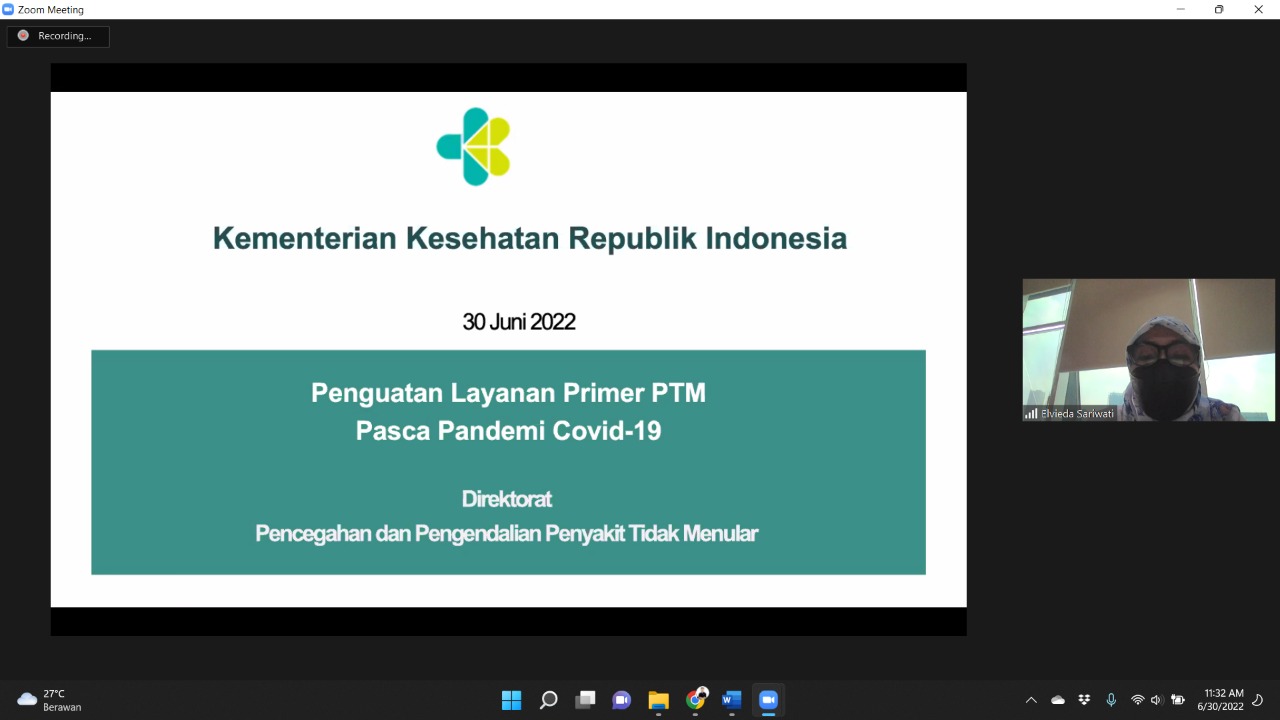Cooperation Between Udayana University Medical Faculty and WHO Indonesia in Strengthening Non-Communicable Disease Services in First Level Health Facilities After a Pandemic
The Corona Virus Disease 2019 (COVID-19) pandemic has lasted more than 2 years which has had an impact on social life and health. Indonesia as one of the countries with a high number of COVID-19 cases and a wide population distribution in 34 provinces was also significantly affected by this pandemic. In the early period of the pandemic, the health care system, including the First Level Health Facility (FKTP) service, was disrupted due to the diversion of resources, the fear of being infected and the government's policy of restricting social mobility.
With this background, the Undergraduate Public Health Study Program (PSSKM) of the Faculty of Medicine, Udayana University, supported by the World Health Organization (WHO) Indonesia, conducted a study on the impact of the pandemic situation on the coverage of Non-Communicable Diseases (NCD) services and adaptation efforts made to overcome service disruptions in Indonesia. FKTP. In connection with this study being carried out, PSSKM FK Unud held an online Policy Dialogue for Strengthening PTM Services at FKTP Post-Pandemic online (30/6/2022).
Coordinator for health research on COVID-19, health system research and health information system WHO Indonesia, Maria Intan Josi, in her speech expressed her appreciation to the research team from Udayana University for their involvement in this research.
"WHO Indonesia would like to invite institutions that specifically have a role and mandate in informing policy makers, and have previous experience in research synthesis for policy.
Researchers from Udayana University are members of the Network of Experts selected by WHO Indonesia. Therefore, we hope that through this dialogue, we can actively discuss in providing input on the studies carried out, hopefully today's activities run smoothly and foster an environment that is conducive to policies based on the use of evidence," he said.
The research team who are members of the WHO Network of Experts for this activity are:
1. dr. I Nyoman Sutarsa, MPH., PhD., FHEA
2. dr. Putu Ayu Swadewi Astuti, MPH., PhD
3. Prof. dr. I Md Ady Wirawan., MPH., PhD.
4. Ni Made Dian Kurniasari, SKM., MPH
5. dr. Wayan Citra Wulan Sucipta Putri, MPH
6. dr. I Made Dwi Ariawan
7. Ngakan Putu Anom Harjana, SKM., MPH
In his remarks, the Coordinator of PSSKM FK Unud, dr. Putu Ayu Swandewi Astuti, MPH., Ph.D., expressed her hope that today's stakeholders can provide input and share their experiences to strengthen the study conducted.
"Thanks to WHO Indonesia and Australia Indonesia Center for the opportunity, cooperation and training provided to us, I hope today's activities run smoothly and we get optimal results from this dialogue." he said.
The main agenda of this dialogue is the presentation of the results of the Rapid Review on the impact of COVID-19 on non-communicable disease services in primary care and its coping mechanisms, by dr. I Nyoman Sutarsa, MPH, Ph.D, FHEA. Then followed by invited speakers.
This event invited 3 (three) resource persons, namely the Acting Director of Disease Prevention and Management of the Indonesian Ministry of Health (dr. Elvieda Sariwati, M.Epid), Head of the P2 Division of the Denpasar City Health Office (dr. A.A Dharmayudha, M.Kes) and the Head of the Community Health Center. II Denpasar Barat (dr. Lanawati, M.Kes) as well as responders from WHO.
The aims of this dialogue are to:
1. Delivering preliminary findings from studies on the impact and mitigation strategies of PTM services during the pandemic
2. Discuss the findings of the study from various stakeholder perspectives
3. Get directions regarding the policy brief plan that will be prepared
Participants who attended this dialogue came from representatives of the Health Office throughout the province of Bali, representatives of Puskesmas in Bali Province, representatives of high schools/colleges in the health sector, BPJS Health, and teaching staff in the field of Public Health.





